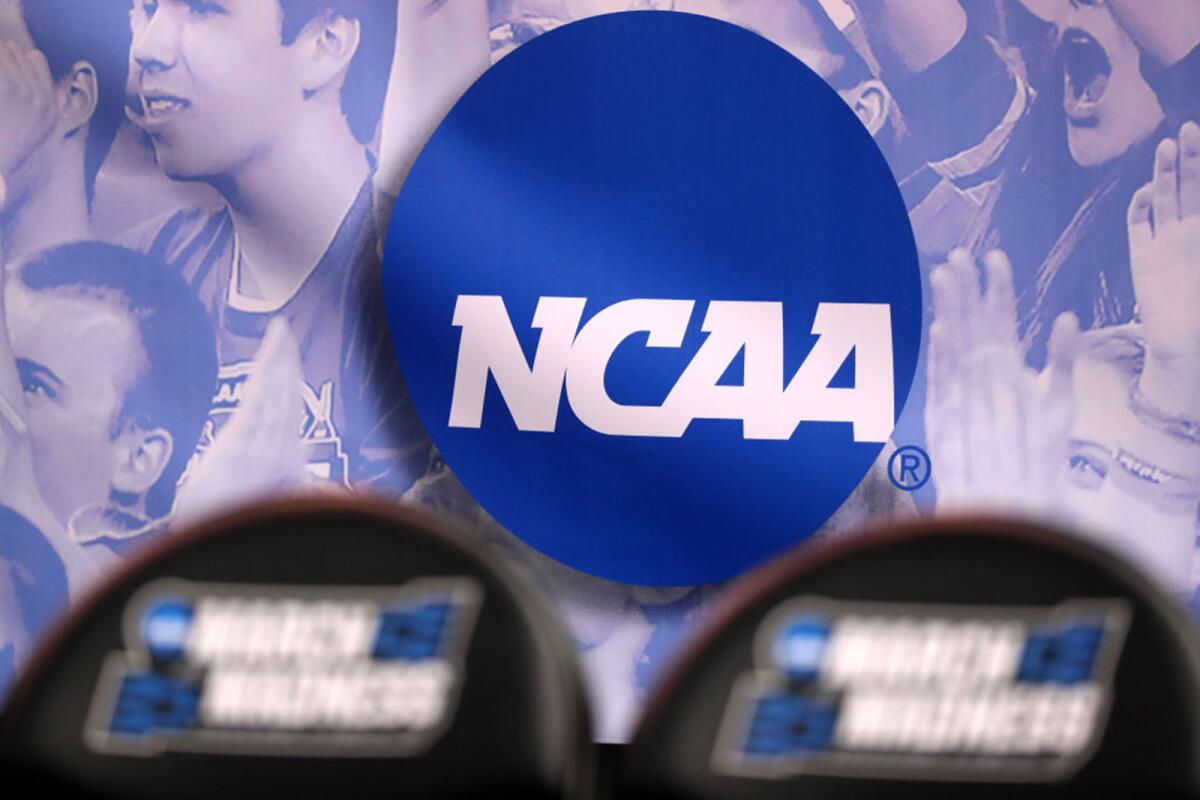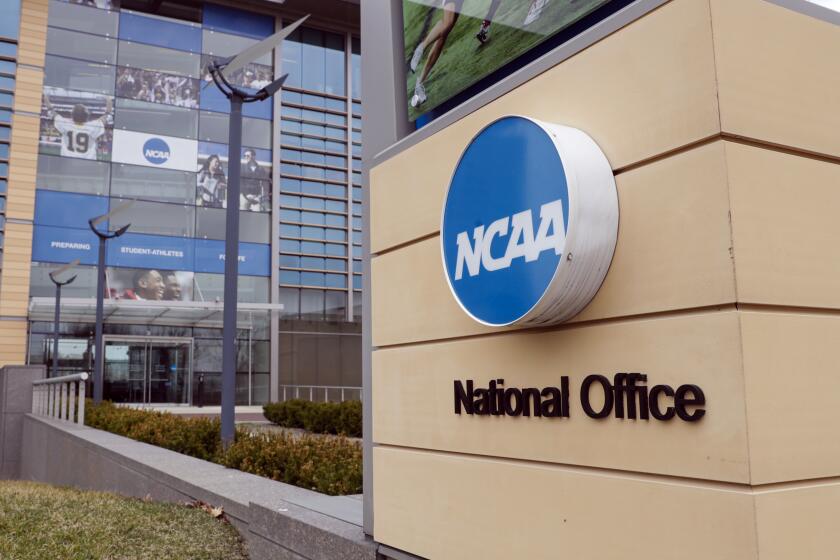NCAA council pushing forward on name-image-likeness issue despite COVID-19 pandemic

- Share via
With college sports on hold because of the COVID-19 pandemic, it would not have been surprising for the NCAA to delay its timeline for proposing new bylaws on name, image and likeness — especially considering how slow-moving the road to change has been already.
But NCAA Division I Council chair M. Grace Calhoun said Tuesday morning that her group will meet as originally planned in late April to push legislation forward.
“It is absolutely still on course, and I can tell you that I haven’t witnessed any slowdown whatsoever,” said Calhoun, the athletic director at Pennsylvania, in a phone interview. “The working groups continue to convene very regularly, and we are still on pace to deliver initial recommendations to the full council for its April meeting, which of course will take place virtually.”
From there, Calhoun said a second wave of proposals that delve into the details of “trickier stuff” like group licensing opportunities for athletes would be prepared for the NCAA Board of Governors in August and that final voting would occur at the annual convention in January 2021.
NCAA voted Monday to approve an extra year of eligibility for spring athletes who had their seasons canceled because of COVID-19 but some might not get same financial aid.
California’s Senate Bill 206, the first to allow college athletes to profit from third-party endorsement deals and hire legal representation, became law in late September but does not go into effect until 2023.
While the “Fair Pay to Play Act” spurred the NCAA into action in the fall, current bills moving through legislatures in other states — like Florida, with a bill that would go into effect July 1, 2021 — have kept the pressure on even with COVID-19 providing schools a plethora of issues that are more timely.
“A lot of the sense of urgency continues to be the state conversations and knowing that we have to really press on with our work to know that we can make our changes with NCAA legislation while continuing to work toward the federal bill,” Calhoun said. “Some of the state timelines have changed. Others haven’t, so we consider our work to still be fast-tracked.”
Calhoun said the NCAA still envisions a federal law that will enable a one-size-fits-all solution, “continuing to understand that 30-plus different state bills is untenable.” The fear from state legislators and those who are deep in the fight for college athlete rights is that the NCAA could use its lobbying connections on Capitol Hill to minimize the impact of name, image and likeness allowances and mostly keep the status quo.
The COVID-19 situation, however, could make it difficult for any federal legislation involving NIL to be worked on.
“I think it will be hard to get anything done through this session. Everything is going to be COVID-19,” said Tom McMillen, a former Maryland Congressman and the president of the Lead1 Assn., which represents the interests of college athletic directors. “I don’t see Congress coming back in any meaningful fashion until July. Then as you get near the fall, elections approach, and the Congressional calendar is very short.”
Rep. Mark Walker (R-N.C.) put forth the first Congressional NIL bill — the Student-Athlete Equity Act — in March 2019. His bill, which would give athletes the rights to their name, image and likeness under no other terms or limitations, was meant to be a simple “first step.”
Walker said Tuesday he met with the NCAA’s legal team then but has not heard from them in the last year, as the association has moved to U.S. Senators Mitt Romney (R-Utah) and Chris Murphy (D-Conn.), who are interested in the issue and could be more “user-friendly,” according to Walker.
Walker recalls Romney giving a speech in October and saying to the NCAA, “We’re coming for you,” but he has not seen anything to back up those words thus far.
“This is how Congress operates sometimes: go out and give a big speech on something, but once you actually read the legislative text, it really wasn’t that bad,” Walker said. “There’s a lot of smoke and mirrors in this town, and the NCAA has a very powerful voice in Washington, D.C.”
Walker said that before COVID-19 his goal to get a federal bill completed would have been September — whether it’s his or another — but that if the virus lives deep into summer there might not be a way to get it done in 2020.
He said it has been a challenge to this point to educate his fellow representatives that NLI is not “pay for play,” as if the athletes would be paid by the schools like employees. He said there has been a lot of misdirection in how NIL is discussed on Capitol Hill.
Then there’s the matter of whether Congress should even be involved in helping the NCAA craft its bylaws.
“I don’t know if that’s the federal government’s job, to write the solution,” Walker said. “I’ve tried to give the NCAA time and take it upon themselves to resolve it and say here’s the solution.”
Walker said he assumed that COVID-19 would lead to the NCAA pushing NIL legislation to the back burner. When he was told Tuesday that Calhoun said the NCAA intends to keep its timeline, he was encouraged yet dubious.
“Let’s not forget, this is something they’ve been promising to work on for the last couple years,” Walker said. “This isn’t just something that blew up in the last couple months.”
More to Read
Go beyond the scoreboard
Get the latest on L.A.'s teams in the daily Sports Report newsletter.
You may occasionally receive promotional content from the Los Angeles Times.












